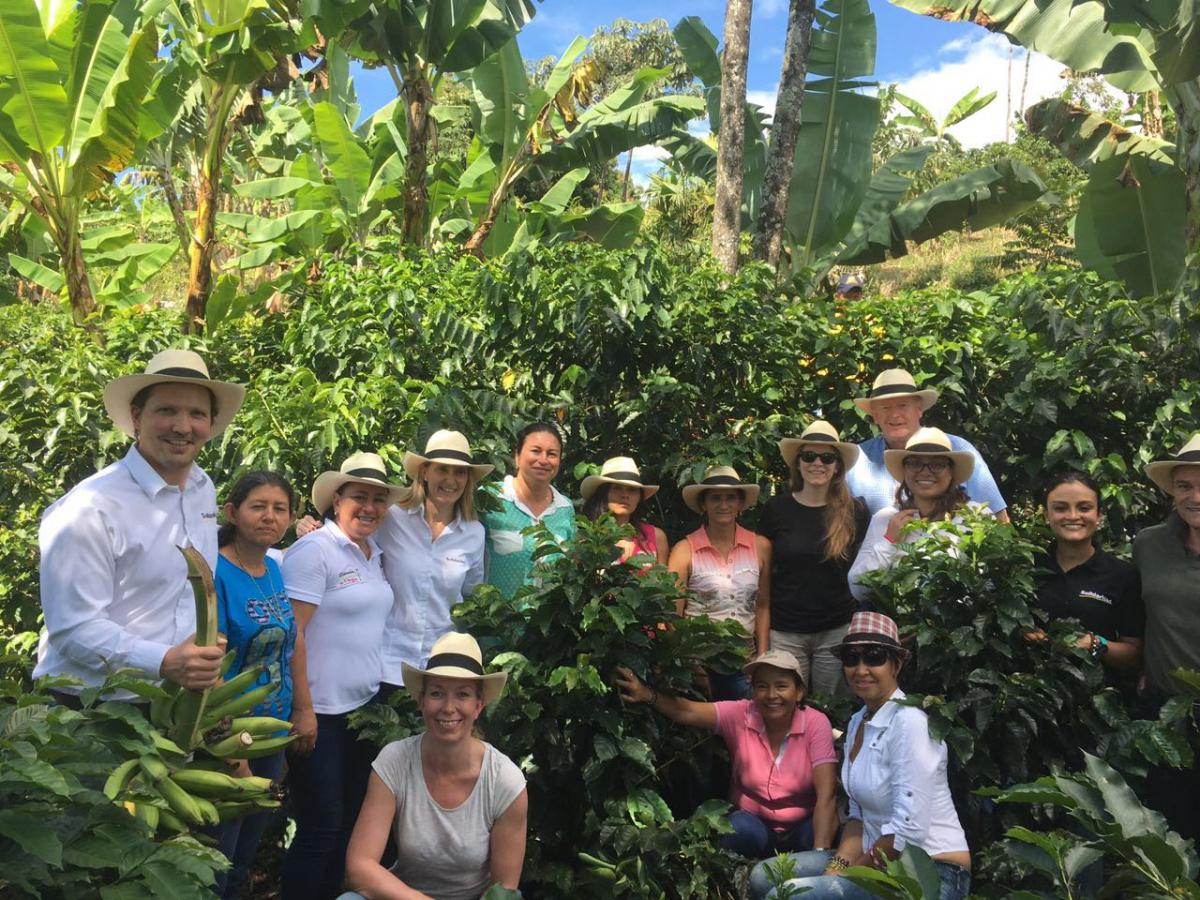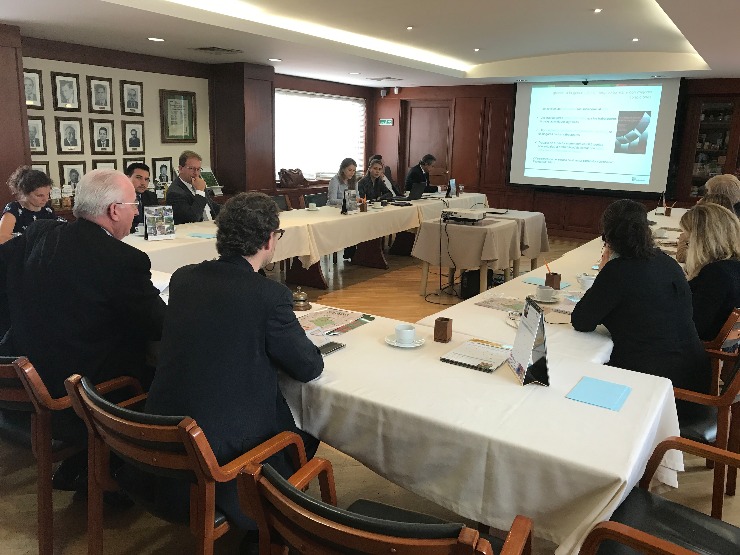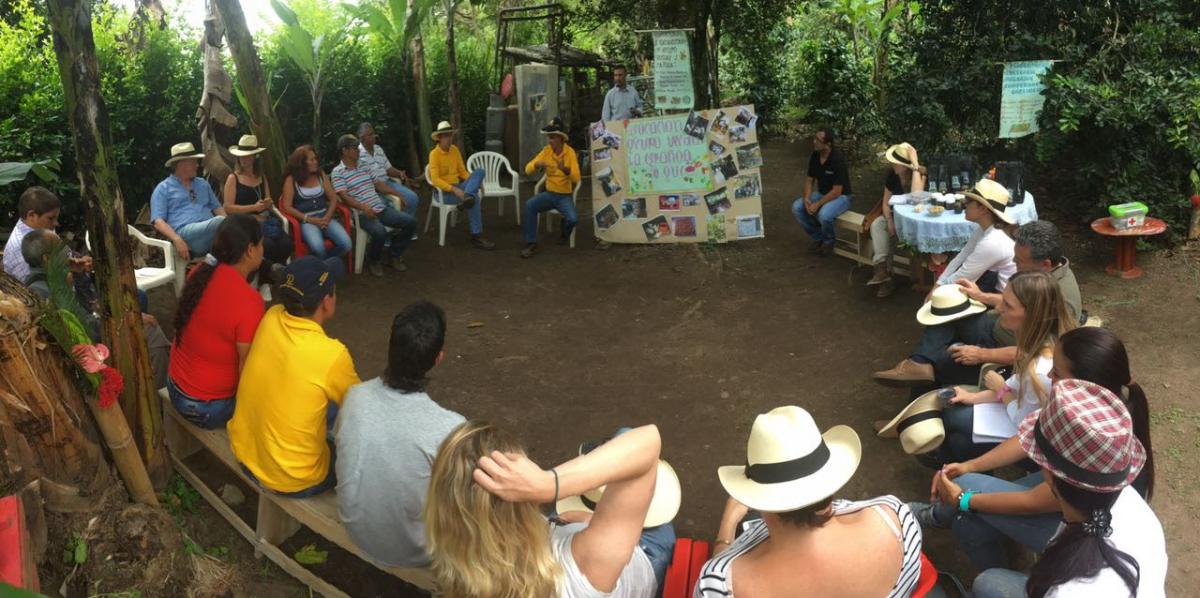
Eva Oskam (front-left) and the Dutch team get a hands-on look at progress in the fields
It's time to scale the solutions and business models that create tangible benefits for smallholders. – Eva Oskam, Policy Coordinator – Sustainable Value Chains, Dutch Ministry of Foreign Affairs
What was your impression of Colombia?
Colombia is a very diverse country, both in its people, landscapes and crops. For example, with almost 60,000 different species, Colombia has a beautiful environment. The people in Colombia are very aware of this and take pride in it, also in conserving nature for future generations. Besides that, I found Colombia to be a vibrant country with very motivated people that are working hard towards growth, peace and sustainability.
What are the major challenges for the sustainable value chains agenda you’re coordinating at the Dutch ministry?
In my opinion, there are two major challenges. On the one hand, there is a concern among producers about the lack of reward for their efforts towards sustainable production. On the other hand, there is still a lot of work to do in assisting less competitive farmers in sustainable production, specifically how to apply good agricultural practices. That's why we chose to work with a partner such as Solidaridad. They are able to train the farmers, scale up and develop new innovative approaches for sustainability while working on platforms and roundtables with governments and businesses.
How do you think Solidaridad is dealing with those challenges in Colombia?
The Sustainable Trade Platforms for the Colombian coffee, palm oil and flower industry that Solidaridad facilitates are a good example of the Solidaridad approach. You’ve gathered more than 70% of the industry and assembled them in a working group. This is challenging, but the resulting non-competitive collaboration between them provides the right incentive to work on common objectives in sustainability. More specifically, it creates a strong commitment to implement joint projects with exporters, research institutes and producers. That can be considered a major achievement in the sector transformation towards sustainability.

Local industry leaders join the roundtable to develop a collaborative strategy
Is there something unexpected, new or interesting that you learned during your field visit to Colombia?
I was very surprised about how advanced some producers, associations and companies are in measuring the impact of sustainability. During our visit to a livestock and sugarcane producer, I was amazed to see their ability to calculate exactly which measures had what effects in terms of CO2 emissions, soil quality and productivity.
Solidaridad focuses on five new innovation areas: impact investment, climate innovation, digital solutions, gender inclusivity and landscape innovation. In which area do you see the best opportunities to advance sustainability?
All five innovations areas are very relevant and in most cases they are interrelated. These areas will help Solidaridad and the partners we’re working with to have more impact on the ground.
What is your opinion about the “beyond certification” agenda?
Certification has always been a tool for sustainability, it has never been a goal in itself. Certification can play a role as a stepping-stone, but it’s important that we don’t leave anyone behind. We need to keep a close eye on the actual impact in the field and how it benefits farmers.
The “beyond certification” agenda should focus on how we make sure that all the producers, also the less competitive smallholders, can tap into sustainability. For that, you need different types of tools, for example, an instrument for farmers to assess their own performance digitally.
Of course, you need to make sure that you are still able to provide some sort of verification to buyers and market players to ensure trust between parties and give assurances that the product is produced sustainably.
So, it would include certification in some way, right?
Certification will not disappear but it will change and perhaps integrate with newer approaches. If you look at what certification has brought us over the years, you see that in many industries there is a “certification ceiling” at around 25% of consumption; often there is much more sustainable production than demand. Furthermore, there are upfront costs of certification, whereas farmers or producers cannot always get the benefits they expect from it. They are not always able to sell their products with price premiums or incentives associated with voluntary or company-specific sustainability standards, so there’s a mismatch there between supply and demand.
I think additional tools to work in sustainability can help overcome this mismatch. You can work with a different approach, for example, by benchmarking farmers within specific production areas. This way you don’t need to check each individual farmer and the associated costs can be much lower.
There’s a lot of innovation in the agro-industry, people are looking for solutions that provide more impact.

Dutch representatives receive field updates on sustainability progress from local farmers
The Dutch ministry supports efforts for more sustainable trade through Official Development Assistance funds. How do you think Solidaridad programmes such as Practice for Change and Advocacy for Change are contributing to the Dutch policy and commitment to the Sustainable Development Goals?
Well, of course, many sustainable development goals are very relevant to my ministry. In my day-to-day work, we mainly focus on SDG 8, which is about economic growth and decent work, and SDG 17 on partnerships. In the Netherlands, we have a long tradition of cooperation with the private sector and civil society. This goes back to our endless fights against flood waters that taught us that success can only be achieved through cooperation. That’s why we do not focus exclusively on one party in our agenda for sustainable growth. We consider our agenda as a joint commitment between governments, companies and civil society.
Solidaridad´s approach complements that agenda, both in the Practice for Change programme, which focuses on partnerships with businesses, and the Advocacy for Change programme, which focuses more on the relationship between governments and stakeholders, creating an enabling policy framework in producing countries.
The Dutch ministry is interested in how smallholders can become entrepreneurs. Did you see any promising approaches in that respect during your visit?
I think it's very important that you include smallholders in the strategy as they make up the majority of rural entrepreneurs. It's so important that we do not leave them behind. Working with larger companie
s that are already very competitive is necessary, but at the moment, it´s time to find solutions and business models that work for smallholders too.
In that sense, I think that the impact investment agenda that Solidaridad is vital. Developing viable business models and solutions for smallholders that enable them to become eligible for financial institutions or impact investment funds is a condition if we want to scale up the solutions in the future.
Learn more about Solidaridad sustainability programmes in South America.
